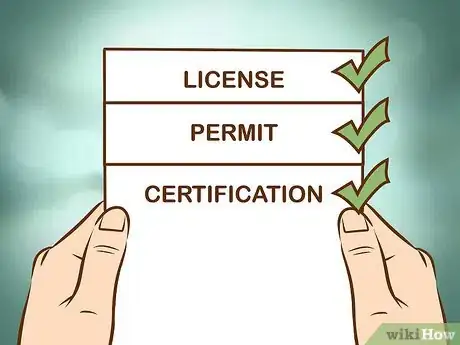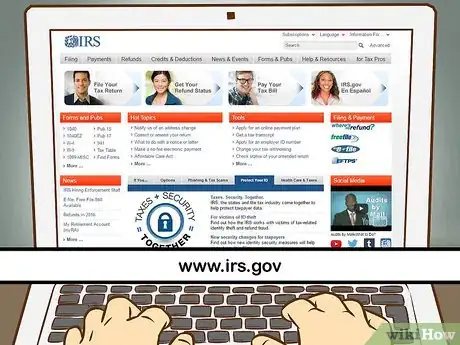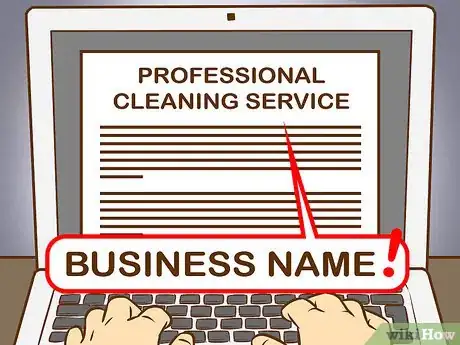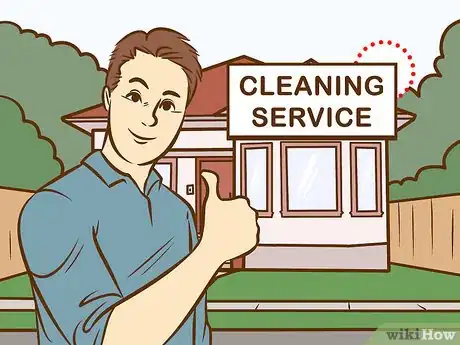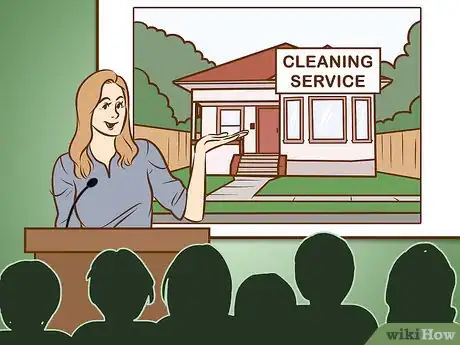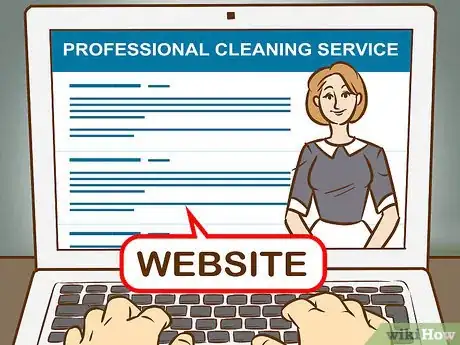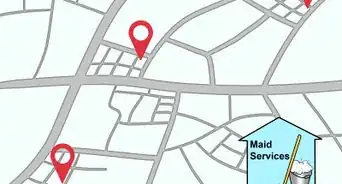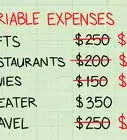This article was co-authored by Jon Gholian. Jon Gholian is a Cleaning Specialist and the Founder of Cleany, a home and office cleaning concierge service based in New York City, New Jersey & Miami. Cleany specializes in providing quality cleaning and handyman services to all their customers. All Cleany employees are insured, bonded, and professionally trained. Cleany has been featured in the New York Times, Bravo & Redfin.
There are 13 references cited in this article, which can be found at the bottom of the page.
This article has been viewed 45,046 times.
Starting a cleaning business can help you generate revenue quickly. Cleaning businesses are also flexible. They can run on a part-time or full-time basis and can even be based out of your home. If you decide to start a cleaning business, there are a few things you should know to increase your chances of success.
Steps
Defining your Business
-
1Determine your target market. Cleaning businesses generally target one of two markets: Either commercial or consumer. Commercial services target businesses. Consumer-based services target individual residences. You should decide which market you will focus on and what services you will offer.
- Cleaning services with consumer target markets usually involve window cleaners or maids who clean personal homes.
- Cleaning services with commercial target markets usually involve janitorial services. They sometimes offer more services than maid services, such as carpet cleaning. [1]
- Some cleaning businesses market to a niche clientele within a target market. You should carefully define what kind of customers you will seek. For example, commercial cleaning services need to decide whether they are serving smaller businesses or huge companies.
- Depending on your budget, it might be a good idea to start small so you can do the cleaning yourself and grow to larger projects as you can afford to add more staff.[2]
-
2Decide whether to franchise. You need to pick whether you want to run your cleaning business independently or as part of a franchise. There are advantages and disadvantages to choosing either route.
- Franchises will offer you some marketing support. They will provide guidance about starting the business, so they can be helpful on the front end if you’ve never run a business before. They will give you guidelines and support so you don’t have to do as much research about the market. You will already have a proven brand.
- Over time, though, you will invest more money in a franchise. If you are independent, you can choose your own services, name, and formula.
Advertisement -
3Get proper licenses and permits. You will need to get a state business license if your state requires one. You also might need other permits depending on the community where your business is located. [3]
- Contact the state business office in the state where your company would be headquartered to determine which state permits or licenses are needed. [4]
- You should also contact the business office at your local city, village, or town hall to ask which permits are needed and to make sure you are complying with all zoning regulations. You may need to obtain permits for things like signage. [5]
-
4Follow all IRS rules. You need to submit some paperwork to start a business with the federal Internal Revenue Service.
- Apply for an Employer Identification Number with the IRS. You can do so online. This is the number that will be used to identify your business. [6]
- Decide the structure of the business entity you are trying to create. For example, will your business be a sole proprietorship or a corporation? Sole proprietorships are businesses run solely by you. In most cases, you may want to go with an LLC, since it offers good balance between protection and the amount of work required to maintain. However, it’s probably a good idea to consult a tax attorney for advice on the different kinds of business structures. [7]
- Decide if you will have employees or independent contractors. When you are just getting started, independent contractors usually make more sense because they are cheaper. But as your business grows, you may want the reliability of employees.
- Make sure that you have all employees fill out the proper tax forms. [8] [9]
-
5Determine your business name. One of the most important things you can do is choose the right name. This is how customers will know your brand.
- It’s smarter to choose a name that is very literal, like “Professional Cleaning Service” with your last name or something like that. Choosing a vague or cute name probably will turn off professional customers.
- Make sure your business name is not too similar to other cleaning services in the area.
-
6Choose whether to run your business out of your home. It’s possible to run a cleaning service from your home. That’s because, unlike many businesses, with a cleaning service, customers won’t come to your home; you go to theirs (or their business).
- Check zoning ordinances at your city, town or village hall to make sure you can have commercial activities in your home. Running the business out of your home might be banned by local ordinance or there just might be restrictions on issues associated with a business, like traffic and signage.
- If you choose a commercial location, it can help you brand your business with signage. However, it doesn’t make sense to pay for a prime location for a business with customers who won’t actually come to the business. So focus more on having enough work space for things like repairing equipment.
Getting your Finances Ready
-
1Create a budget. You are going to need some money on the front end to start a cleaning company. You will need to buy equipment, for example.
- You may be able to obtain traditional financing to get your business started. Lenders may want to see a formal business plan, in which you pull together all aspects of your business, from the financing and expenses, to the name, marketing plan, and customer base. [10]
- Include all expenses, such as insurance, taxes, transportation expenses, cleaning supplies, and so forth, when determining your budget.
- Develop a billing system. Will you do work on credit? This can be more common when dealing with businesses. Specify when a bill becomes past due and any late payments. Use spreadsheets and accounting software to manage your budget. [11] You might want to consider an investor who would contribute to the financial costs of the business.
- Check into whether you qualify for government programs that give grants to small businesses, especially those started by minorities, women, and veterans.
- Open a business checking account. Contact an accountant, and decide whether you want to create a Limited Liability Corporation or corporation to run your business. [12]
-
2Set your prices. Research before you set your price. To determine how much you will charge your customers, you need to figure out your costs.
- Assess how much you pay for labor and materials. Turn the cost of labor into an hourly rate.
- The average rate that most cleaning services charge customers is between $75 for a rural areas and as much as $150 for an urban area. But it really depends on what the competition is charging, so make sure you research what other cleaning companies in the area charge.
- Determine whether to charge a flat rate or an hourly rate. Usually cleaning services charge a flat rate. You need to consider the size of the house, how many times you will be cleaning the property, and about how many hours it will take to clean. [13]
- Sometimes cleaning services will charge a different rate for special projects or by room. It costs more to clean a kitchen than a bedroom, for example, but this can become very complex. With very large homes, some services charge a square foot rate.
- Determine how much you are paying for overhead. For example, what’s the cost of all non-labor expenses that would be incurred by your business? Examples of overhead include paying for gas for your van or utilities and cleaning supplies. Figure out how much profit you are seeking to accrue.
-
3Obtain liability insurance. This is usually a must for any business like a cleaning service. You can get liability insurance through local insurance agents in your area.
- Experts say $500,000 is a good amount to get, but you should rely on the advice of a professional who can assess your specific business needs. The average cost for liability insurance for this kind of business is about $500 a year.[14]
- Liability insurance is important in case there is an accident or damage caused during the cleaning process.
- You might also consider bonding insurance, which would protect you from problems with employees, such as stealing or failing to properly do the job.
-
4Buy equipment. Cleaning companies require some start-up equipment. The good news is that cleaning companies typically have pretty low expenses compared to other businesses. [15]
- Obviously, you need to purchase cleaning supplies, such as mops, dusters, vacuum cleaners, and the like.
- You will need a vehicle for your cleaning crew. You could put your company name on the side of it to help brand the company. You will probably need a truck or van if your service will perform janitorial services.
-
5Decide on staffing levels. You could start with just yourself or advertise for a couple of maids or janitorial workers.
- Try to save money wherever you can. For example, you might buy equipment that can do multiple jobs, such as a steam cleaner that also serves as a dry vacuum.
- You could advertise traditionally in the newspaper or online for employees or you could use sites online where employees are seeking jobs in cleaning.
Finding Customers
-
1Use word of mouth. Decide on the geographic area you are serving first. Then find ways to tap into local networks where people will share information on your company in a positive way. This will help you find customers.
- Cleaning services rely heavily on word-of-mouth. So get the word out through your networks of friends.
- Offer special discounts to new clients and offer promotions. For example, you could base your discounts around holidays.
- Give your clients business cards and refrigerator magnets so they can recommend your company to friends. [16]
-
2Try advertising. Consider traditional advertising in the newspaper, but don’t forget more modern forms of advertising such as through social media and Internet sites like Craig’s List.
- You should take advantage of free local ways to advertise, such as posting flyers on grocery store bulletin boards.
- If you are seeking professional clients, put flyers up in business parks. Get involved in local business groups and the Chamber of Commerce. Be active in the business community. [17]
- Create professional social media pages for your company on Facebook and Twitter. You could create Facebook ads for relatively cheap and target them to the right demographic and geographic area.
-
3Create a website. Having a website will make your company look more professional in addition to getting you more customers.
- It's best to get a professional looking one. You might be able to ask a local college if they have any student interns who are qualified to do so for you.[18]
- You could include personal testimonials from customers on your website.
-
4Research potential customers. Once you narrow your geographic area, make a listing of businesses in the area that could become potential customers.
- Don't be hesitant to reach out. Call the office manager of each business to offer your services.
- Be prepared to have a detailed presentation ready on your company and the services it offers in case the business is interested.
References
- ↑ http://www.entrepreneur.com/article/41426
- ↑ http://www.startcommercialcleaningbusiness.info/steps-1--5.html
- ↑ https://www.sba.gov/business-guide/launch-your-business/apply-licenses-permits
- ↑ https://www.sba.gov/business-guide/launch-your-business/apply-licenses-permits
- ↑ http://www.entrepreneur.com/article/38882
- ↑ http://www.irs.gov/Businesses/Small-Businesses-&-Self-Employed/Employer-ID-Numbers-EINs
- ↑ http://www.irs.gov/Businesses/Small-Businesses-&-Self-Employed/Sole-Proprietorships
- ↑ https://www.irs.gov/businesses/small-businesses-self-employed/checklist-for-starting-a-business
- ↑ http://www.irs.gov/Businesses/Small-Businesses-&-Self-Employed/Business-Structures
- ↑ http://online-cleaning-coach.com/
- ↑ https://www.care.com/a/how-to-start-a-cleaning-business-1303130733
- ↑ http://online-cleaning-coach.com/
- ↑ https://www.care.com/a/setting-cleaning-rates-1303130514
- ↑ http://www.startcommercialcleaningbusiness.info/steps-1--5.html
- ↑ http://online-cleaning-coach.com/
- ↑ http://www.startcommercialcleaningbusiness.info/step-6-advertising.html
- ↑ https://www.wikihow.com/Attract-Clients-for-a-Residential-Cleaning-Service
- ↑ http://www.startcommercialcleaningbusiness.info/step-6-advertising.html
About This Article
To start a cleaning business, you may need to obtain a business license and other permits, depending on where you live. Since you'll definitely need money to get your business off the ground, look into taking out a business loan, applying for government grants, or finding an investor. In addition to getting your finances in order, you’ll also have to come up with a name for your business, find a way to advertise, and decide whether you want to hire staff or do all of the work yourself. To learn some pros and cons of running your cleaning business out of your home, keep reading!


